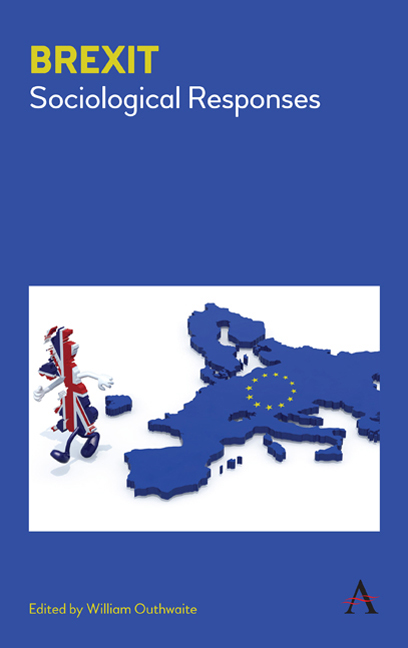Preface
Published online by Cambridge University Press: 10 January 2018
Summary
Less than six months after the United Kingdom referendum, sociologists and other social scientists are evaluating the implications both for the UK, or whatever remains of it, and, more importantly, for the European Union and for Europe and the world.
Some of these are already evident. The vote has revealed cleavages across the UK on a regional and class basis, paralleled, for example, in the support in France for the Front National. In the UK, we have seen the revival of a kind of class politics, in which working- class voters swing Right rather than Left, reinforcing the middle- class ‘leave’ vote in much of the richer south of England. The regional divisions are hard to explain: the most deprived areas of the UK, which have benefited substantially from EU development aid, were often those most hostile to membership in the EU.
In the rest of Europe, the vote has opened up as a serious prospect what was previously only a pipe dream of the political fringes: withdrawal from the EU itself. Although one can put this in the context of the Union's failure to attract the support of enough voters in Norway and Switzerland for membership, the shock effect is incomparably greater. The UK was always a semi- detached member state, with opt- outs from Schengen and the euro, but it still carried substantial weight in the formation of EU policy. Even if the vote had gone the other way, however, the UK had already trashed what remained of its reputation as a serious member of the Union. Although one of the immediate responses has been a rise in support for the EU across much of Europe, Brexit has massively strengthened the forces of (mostly right- wing) populist insurgent politics, adding withdrawal to the more local themes of migration and ‘Islamization’ that play out in different variations across Europe. In the UK, even before the vote, the campaign produced a wave of what, since it was the result of the government's decision to call a referendum, might reasonably be described as state- sponsored hate crime, which has so far cost the lives of a British Member of Parliament and a Polish resident.
- Type
- Chapter
- Information
- BrexitSociological Responses, pp. vii - viiiPublisher: Anthem PressPrint publication year: 2017



